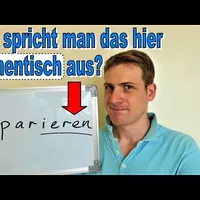Die authentische Aussprache für Verben auf "-ieren" - Pronunciación auténtica en alemán
Hallo! Eine Frage: wie spricht man dieses Wort hier richtig aus? Dieses Verb hier
heißt auf Spanisch "arreglar", auf Englisch "to repair" und auf Chinesisch 修理. Heute sehen
wir uns Verben an, die im Deutschen diese Endung hier haben, denn die kommen oft
vor und manchmal ist die Aussprache auch nicht ganz klar.
Also, wie würdest du dieses Wort aussprechen?
Ich geb dir mal ein paar Sekunden. Ja, okay? Heute zeige ich dir eine "offizielle"
Aussprache und eine "authentische" Aussprache, die wir Muttersprachler
eigentlich verwenden. Denn es gibt eigentlich einen kleinen Unterschied und
heute zeige ich dir diesen Unterschied. Los geht's! Schauen wir uns gleich ein paar
von diesen Verben hier an. So und wir schauen uns an, wie wir das normalerweise
aussprechen, wie wir Muttersprachler das aussprechen . Also, wir sagen eigentlich
nicht "-ieren", zum Beispiel wie in reparieren oder hier studieren
organisieren...Nein das sagen wir nicht so, weil es einfach schwierig auszusprechen
ist, es ist unangenehm, sondern wir sagen eigentlich "ian". Das ist kürzer und es
ist viel angenehmer und natürlicher. Also, wir sagen nicht reparieREN, sondern
reparieren. Und wie sprechen wir jetzt die folgenden Verben hier aus?
Das erste Verb ist studieren. Studieren. Sprich mir nach. Also, wir sagen nicht
studieREN, das ist einfach unangenehm, studieren. Organisieren
Sprich du nach! Organisieren. Nächstes, diskutieren.
Und habe ich noch ein Wort, reservieren.
Und jetzt üben wir diese Aussprache noch einen Schritt weiter. Wir schauen
uns einfach die Konjugation von diesen Verben an.
Ich habe hier das Verb "reparieren", aber die Aussprache bei der Endung, ist
eigentlich immer die gleiche. Okay, los geht's. Wie spricht man das aus? So, ich
repariere, ich repariere, du reparierst, er, sie, es repariert, wir reparieren,
ihr repariert, Sie oder sie reparieren. Die Endung für "ich" ist ja ein "-e",
oder konkret ausgesprochen ist das ein -e (=ä) repariere, organisiere, studiere und
weil wir hier noch ein "r" haben, sprechen wir das im Standarddeutschen auch alles
genau aus. Also, ich repariere, ich studiere, ich organisiere, ich diskutiere
usw. Im Dialekt oder sagen wir in der
Umgangssprache geben wir das eigentlich dann weg. Also, wir sprechen das nicht
mehr aus und wir sagen eigentlich in der Umgangssprache dann ich reparier', ich
diskutier', ich organisier', ich studiere'. Das ist ein kleines Detail und in einem
anderen Video werde ich diese kleinen Unterschiede zwischen und Umgangssprache und
formaler standarddeutscher Hochsprache noch einmal genau herausarbeiten. Und zum
Schluss das Ganze noch einmal in Beispielsätzen. Los geht's! Hier haben
wir: Ich repariere meinen Tisch Das nächste: Was studierst du?
Ich studiere Wirtschaft. ich möchte eine Party organisieren.
Er diskutiert gerne über Politik.
Ich reserviere ein Hotelzimmer. Und der letzte Satz: Reserviert du bitte einen
Tisch? Hat es dir gefallen? Hat es dir geholfen? Dann kannst du dieses video auch gerne mit
anderen Deutschlernern teilen. Wir sehen uns bald wieder, alles Gute!

